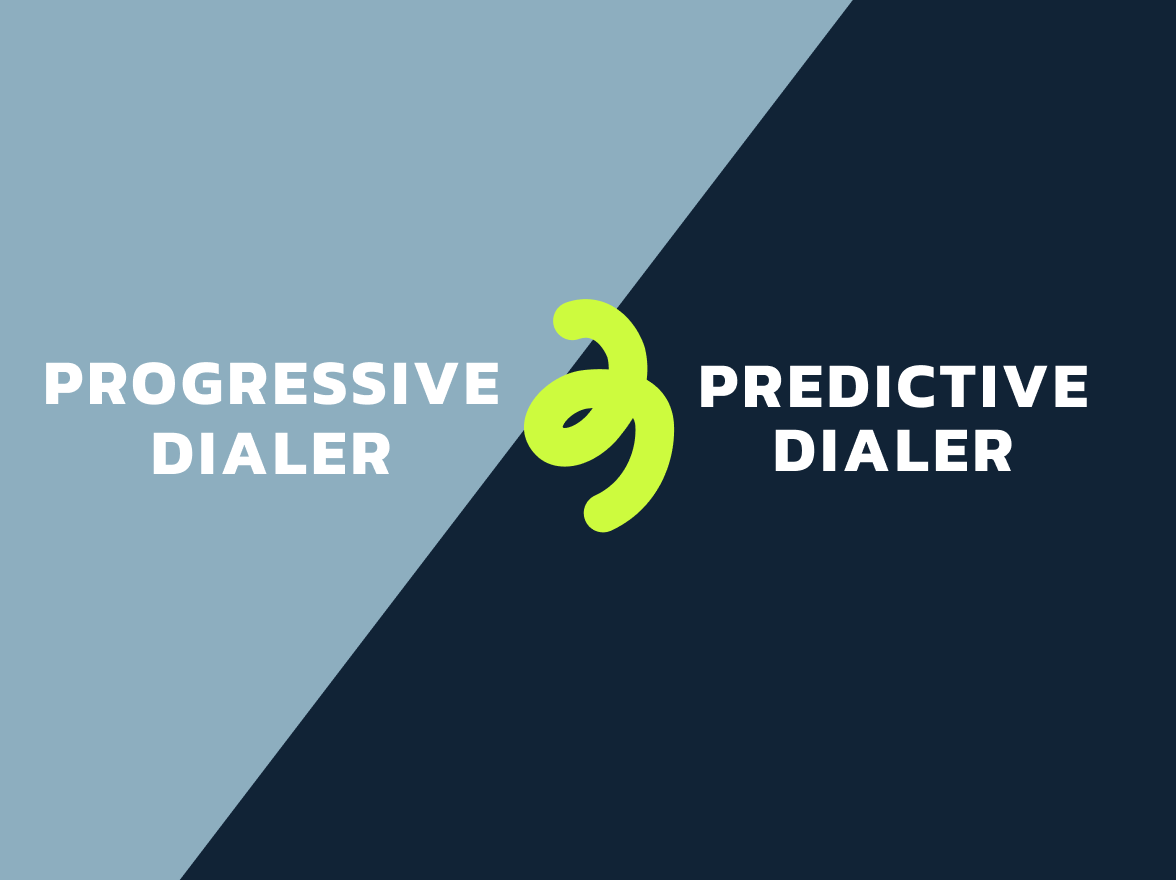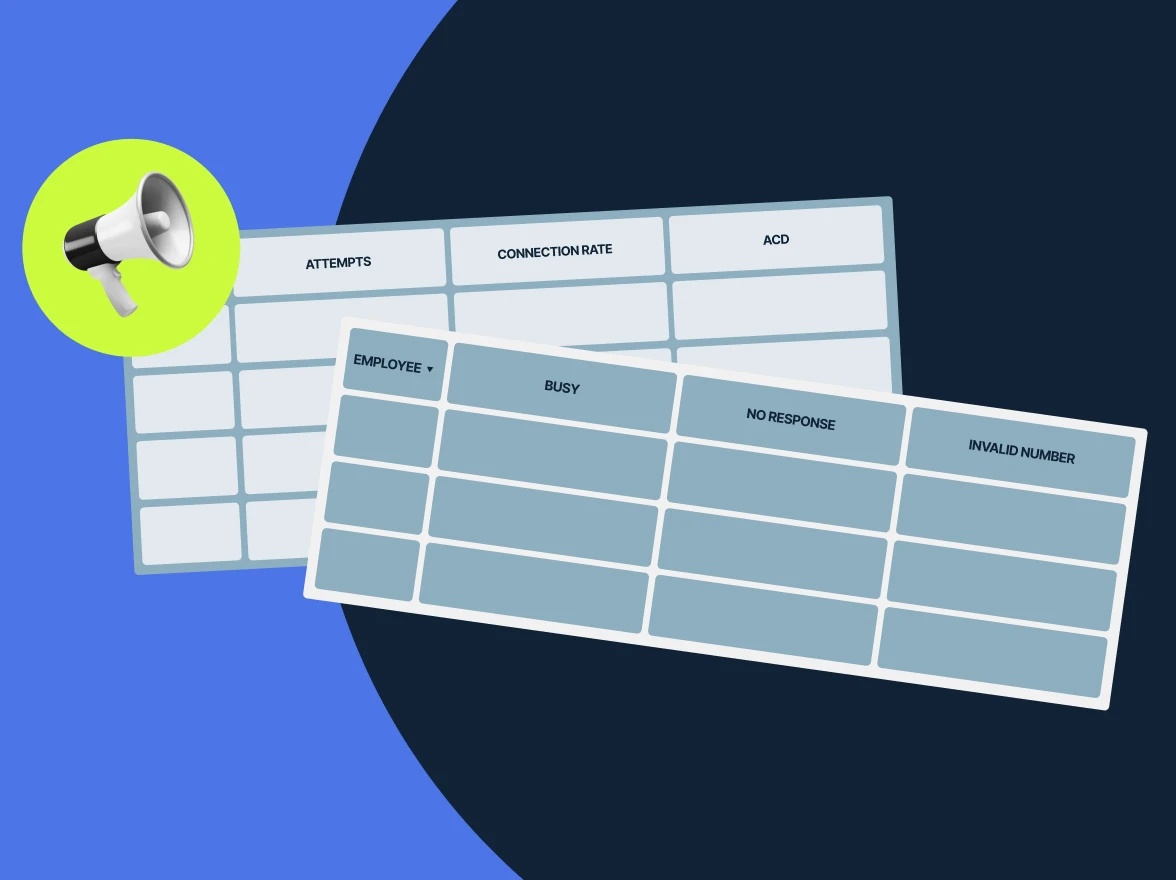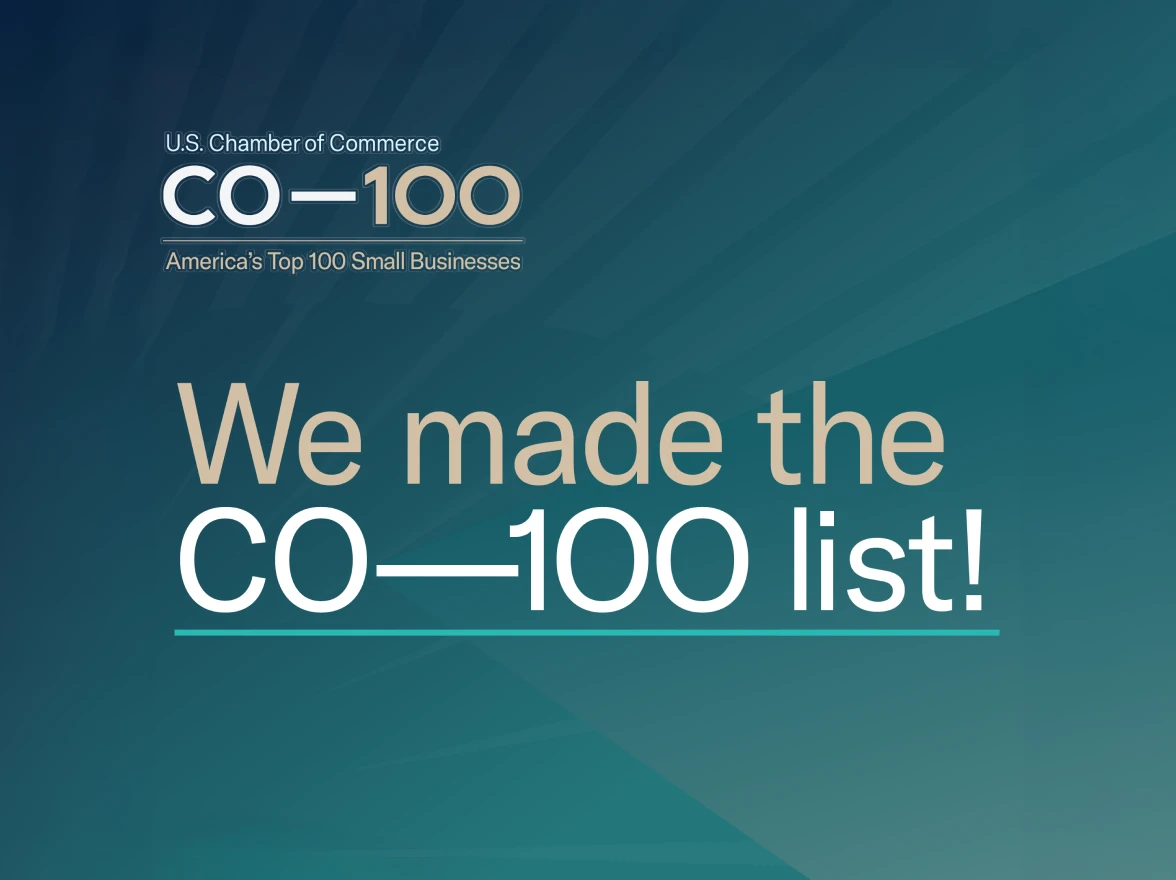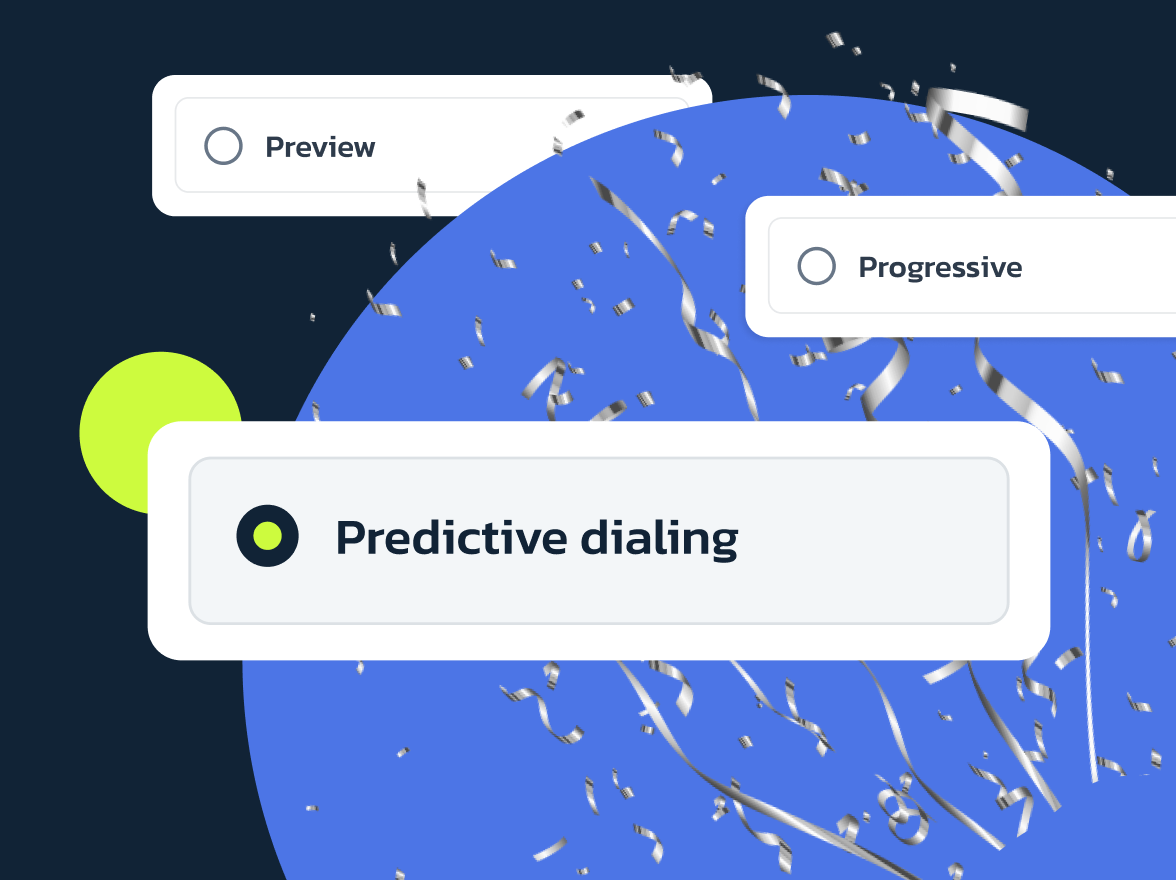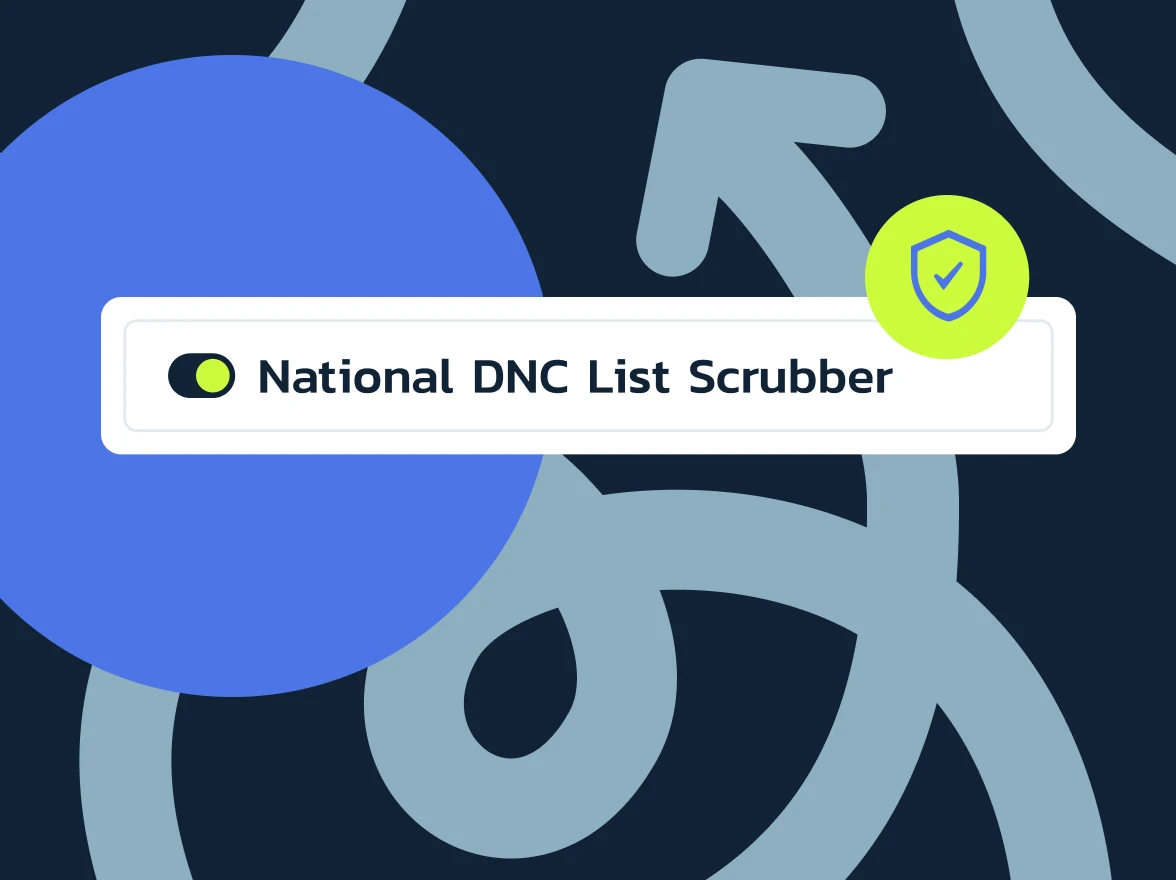Are you looking to improve your call center’s performance but not sure which dialing technology to choose? Call centers rely heavily on advanced dialing technologies to improve their operations. Understanding the differences between progressive and predictive dialers is crucial for organizations looking to upgrade their outbound call strategies.
This guide will explore the fundamental differences between progressive and predictive dialers, helping you determine which is best suited to your business’s specific requirements and goals. Whether you are managing a large-scale telemarketing campaign or a focused customer service effort, selecting the right dialer can significantly impact your success.
What is a progressive dialer?
A progressive dialer is an automated telephony tool designed to help call centers manage their outbound calls in a more organized and effective manner. A progressive dialer automatically calls the next number from a predefined contact list immediately after the current call concludes. This method ensures that agents have minimal downtime between calls, maintaining a consistent and continuous call flow.
This type of dialer is particularly useful for scenarios such as lead generation, follow-ups, or conducting customer surveys where it’s essential for agents to stay actively engaged without the risk of call overlaps. The progressive dialer offers a solution by automating the dialing process while still providing agents control over the pace of the calls, making it suitable for many outbound call center operations.
How it works
The progressive dialer operates with a focus on maintaining a steady call flow and minimizing downtime for agents. Here’s a step-by-step look at its functioning:
- Initial contact: The system dials a contact first, ensuring that by the time the agent is connected, the lead is already on the line.
- Wrap-up time: After a call ends, the agent is given time to complete any necessary after-call activities, helping them prepare for the next interaction without feeling rushed.
- Sequential dialing: Once the agent completes the wrap-up, the system automatically dials the next contact on the list, reserving an available agent for the call.
- One-to-one ratio: The dialer maintains a 1:1 ratio between calls made and agents available, ensuring quick agent response and successful handling of each lead.
- Handling non-responses: If a contact does not answer or a voicemail is reached, the dialer immediately moves to the next number, ensuring agents connect only with live contacts.
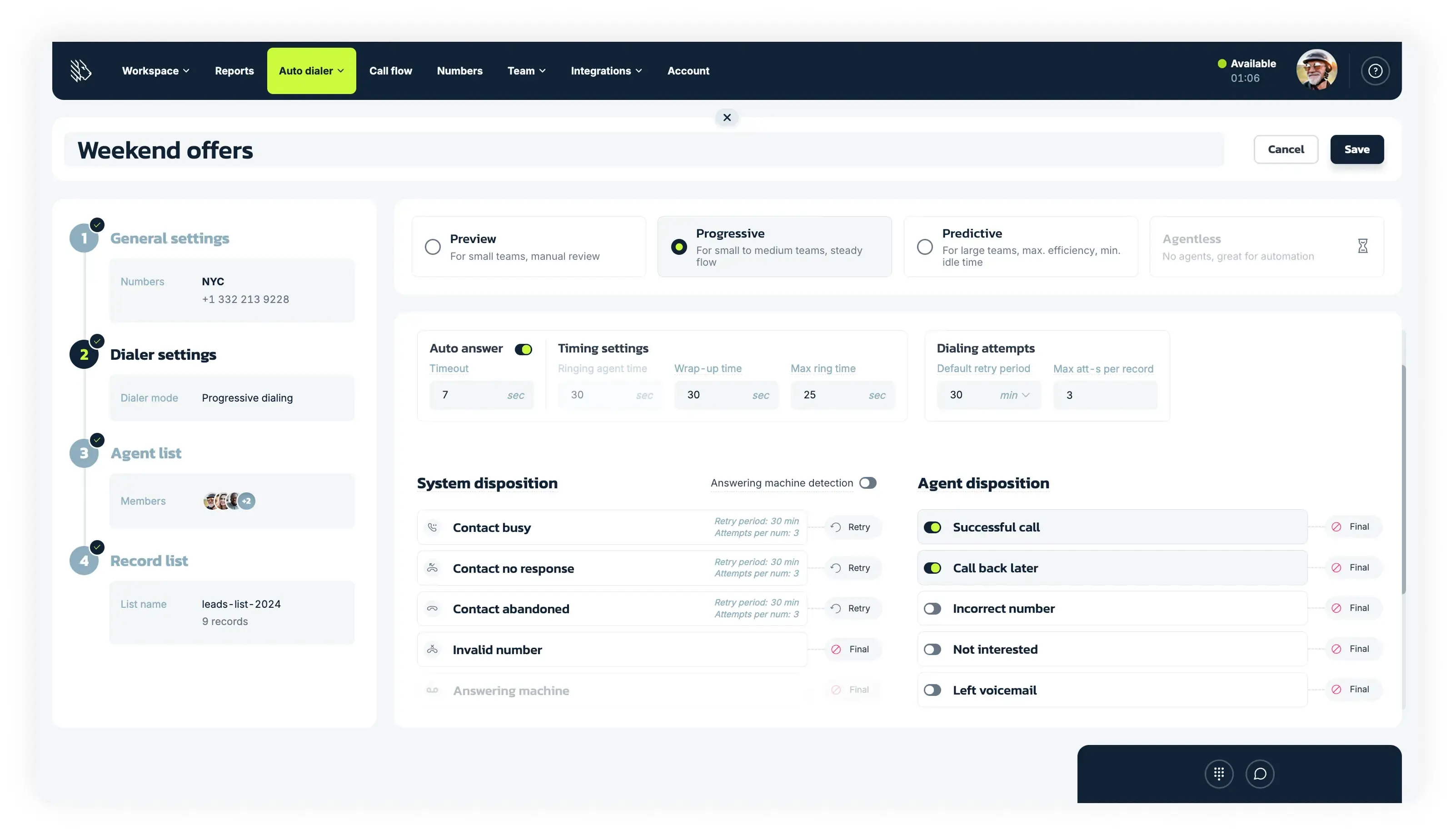
Pros & Cons
| Advantages | Disadvantages |
|---|---|
| Controlled call pacing: Provides a consistent pace without overwhelming agents, making it easier to manage call flow | Less effective for very high volumes: Not as fast as predictive dialers in environments that require extremely high call volumes |
| Reduced idle time between calls: Automatically dials the next number, reducing wait times for agents between calls | Dependency on agent availability: If no agents are available, calls cannot be placed, which may delay operations |
| Suitable for any team size: Appropriate for teams of all sizes, even with just one agent | Limited scalability: May not be suitable for very large-scale operations that need extensive call handling |
| Improved compliance with regulations: Reduces the risk of compliance issues by not over-dialing or abandoning calls | May require more agents: Higher agent-to-call ratio needed compared to predictive dialers, potentially increasing labor costs |
Who should use it?
Progressive dialers are well-suited for businesses that require a steady flow of calls with a moderate to high call volume, but not at the scale where predictive dialers become necessary. This dialer type is oriented towards tasks that benefit from careful handling and personal attention.
Industries that typically use progressive dialers include:
- Customer service: Managing follow-up calls.
- Sales: Small to medium-sized sales teams where each call needs a personalized approach.
- Healthcare: For appointment reminders and patient follow-ups, where a consistent call rate helps manage workload.
- Financial services: Such as collections or advisory services, where compliance and customer interaction quality are priorities.
- Education: For outreach to prospective students or maintaining contact with enrolled students.
MightyCall’s progressive dialer
If your business fits these scenarios, our progressive dialer services can provide the right balance of automation and personal interaction, ensuring your team performs optimally while maintaining high customer satisfaction. MightyCall’s progressive dialer is equipped with answering machine detection (AMD), AI call summaries, local presence, and auto answer, which, when enabled, deliver the fastest possible dialing speed.
What is a predictive dialer?
A predictive dialer is an automated dialing system used in call centers to increase the success rates of outbound call campaigns. This technology dials multiple phone numbers at once and connects agents only to calls that are answered by live individuals. By estimating when agents will be available and adjusting the calling rate accordingly, predictive dialers reduce idle time and maximize talk time.
This functionality is especially beneficial for large call centers with at least 5 agents managing high volumes of calls, as it allows agents to spend more time communicating with potential customers rather than waiting for connections.
How it works
The predictive dialer uses advanced algorithms to optimize the call process in call centers. Here’s a concise breakdown of how it functions:
- Multiple contacts: The system initiates calls to multiple contacts simultaneously, ensuring a high volume of ongoing calls.
- Agent connection: When a contact answers, the system instantly connects them to an available agent, minimizing wait times for both parties.
- Algorithmic Predictions: Some services, such as MightyCall, offer a couple predictive dialer algorithms:
- Predict agent availability: Estimate when an agent will be free to take a call, optimizing call timing.
- Analyze campaign metrics: Monitor metrics such as contact list engagement and the number of abandoned calls to refine the calling strategy.
- Recommended abandonment rate: MightyCall recommends maintaining an abandon rate of no more than 3% to comply with regulations. This helps balance operational performance with legal compliance.
- Handling non-responses: If a contact doesn’t answer or a voicemail is encountered, the system immediately moves on to the next contact. This ensures that agents are only connected to live interactions, further reducing downtime.
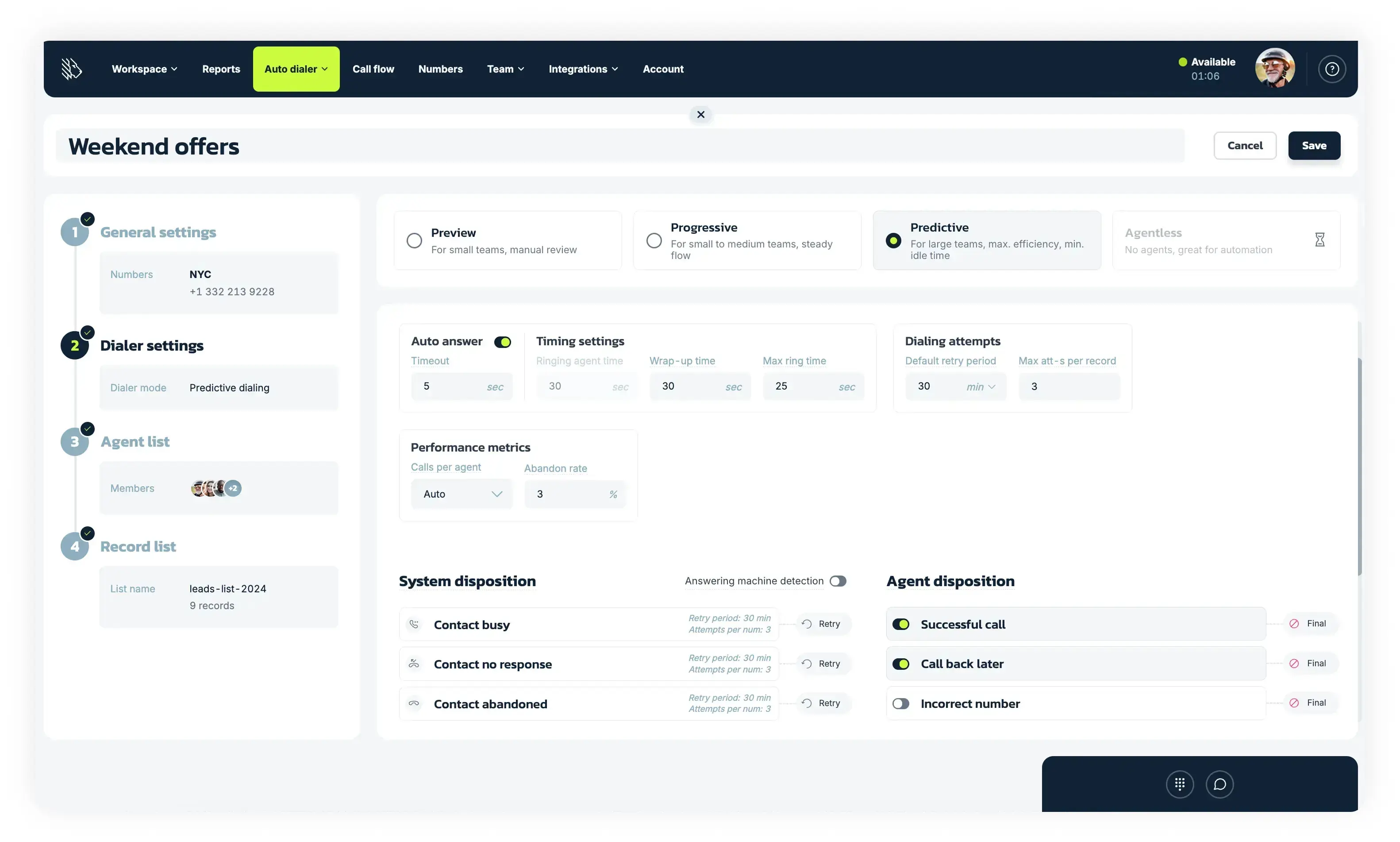
Pros & Cons
| Advantages | Disadvantages |
|---|---|
| High call efficiency: Maximizes the number of live connections by dialing multiple numbers simultaneously | Risk of dropped calls: Can lead to dropped calls if no agents are available when a contact answers |
| Reduced agent idle time: Keeps agents continuously engaged by minimizing wait times between calls | Complex management: Requires sophisticated management and tuning to optimize call timings and agent availability |
| Enhanced productivity: Enables agents to handle more calls, increasing overall productivity | Customer experience: May lead to a less personalized customer experience as calls are highly automated |
| Scalability: Ideal for call centers handling high volumes of calls | Compliance concerns: Higher risk of violating regulations like the TCPA due to automated dialing practices |
| Advanced analytics: Provides detailed insights into call outcomes and agent performance | Technology dependency: Heavily relies on algorithms and accurate data for effectiveness |
Ideal users of a predictive dialer
Predictive dialers are best suited for large-scale operations that prioritize high call volumes and speed over personalized customer interactions. These systems are designed to maximize outreach and agent productivity by automating the dialing process.
Industries that typically benefit from predictive dialers include:
- Telemarketing: For high-volume sales and promotional campaigns.
- Debt collection: To increase contact rates and speed.
- Market research: For conducting large-scale surveys and data collection.
- Customer support: For handling high volumes of customer inquiries and follow-ups.
- Political campaigns: To maximize voter outreach efforts.
MightyCall’s predictive dialer
If your business operates within these industries and requires fast handling of a high volume of calls, MightyCall’s predictive dialer services can provide the necessary tools to optimize your call center operations. Our predictive dialer is designed to meet the needs of small to medium-sized businesses by adapting enterprise-level call center technology.
Key features of MightyCall’s predictive dialer include:
- Enterprise-level technology for SMBs: Offers advanced call center functions adapted to the scale of small and medium-sized businesses.
- Intuitive interface: A user-friendly design that allows agents to navigate the system with ease.
- Flexible settings: Customizable options to adjust the dialer according to your specific campaign requirements.
- High-availability seamless redundancy infrastructure ensures 99.99% uptime even in peak hours.
- National DNC integration: Incorporates the national Do Not Call registry to help you comply with regulations.
- Advanced predictive dialing algorithms: Our algorithm works to minimize wait times and reduce abandoned call rates, improving agent productivity and customer satisfaction.
- 10-line predictive dialing: Supervisors can manually control how many calls go out per agent (from 1 to 10), adjusting the speed of each campaign based on the quality of the contact list.
- Answering machine detection (AMD): Automatically identifies and skips voicemail responses, so agents only spend time talking to real people.
- Auto answer: Set a custom number of seconds so campaign calls are automatically answered without manual action from the agent, keeping the workflow fast and uninterrupted.
- Local presence: Projects a local caller ID on outgoing calls to increase connection rates and foster trust with potential customers.
- Voicemail drop: Allows agents to deliver pre-recorded voicemail messages in seconds, minimizing idle time and maximizing productivity.
- AI call summaries: Leverages AI to produce accurate, easy-to-search call summaries, making follow-ups and record management faster and more efficient.
By integrating MightyCall’s predictive dialer, your business can handle high volumes of calls effectively while maintaining a high level of customer service.
Progressive dialer vs. Predictive dialer: Key differences
Choosing the right dialing technology is crucial for optimizing call center operations. Predictive and progressive dialers, while similar in their goal to improve efficiency, differ significantly in how they manage calls and the specific use cases they best serve. This section outlines the primary differences between these two types of dialers to help you determine which might be best suited for your business needs. Below, a comparative table provides a clear overview, followed by detailed explanations of each key difference.
| Feature | Progressive dialer | Predictive dialer |
|---|---|---|
| Call automation | Automatically dials the next number sequentially | Fully automated dialing of multiple numbers simultaneously |
| Agent involvement | Low, as agents handle one call at a time | Minimal prior to call connection; focuses on high throughput |
| Operational speed | High; ideal for steady call flow | High; suitable for large-scale operations |
| Suitability based on team size | Works for any team size | Great for 5+ agents |
| Ideal business size | Call centers with 5+agents | Smaller teams or specialized scenarios |
| Call personalization | Agents have brief pauses between calls | Low; limited time for agents to prepare between calls |
| Regulatory compliance risk | Lower; more controlled dialing reduces compliance risks | Higher; due to rapid call rates and potential abandon rates |
Call automation
Predictive dialers are designed to maximize call volume by dialing multiple numbers simultaneously and using algorithms to predict when agents will be available, thereby reducing idle time significantly. This is ideal for high-volume scenarios where the priority is on quantity and speed. Progressive dialers, in contrast, dial one number after another as soon as the previous call is completed, ensuring a continuous but more controlled call flow without overwhelming agents.
Agent involvement
In predictive dialing systems, agent interaction before the call is minimal, and the focus is on connecting agents to calls where a live person has already answered. This can enhance throughput but may reduce the opportunity for agents to prepare. Progressive dialers allow for more thoughtful engagement since agents handle calls consecutively, giving them time to briefly prepare or note details between calls.
Operational speed
Predictive dialers operate at a higher speed, making them suitable for large call centers that need to process a large number of calls. This setup can significantly increase operational throughput but may not always ensure the quality of each customer interaction. Progressive dialers, while slower, provide a more measured approach that can benefit call quality and agent stress levels.
Suitability based on team size
Large teams benefit more from predictive dialers as they can handle the high operational demands and fluctuating call availability. Progressive dialers are better suited for smaller or medium-sized teams where the call volume is manageable but still requires fast handling without the need for simultaneous call placements.
Call personalization
The nature of predictive dialers leaves little room for call personalization, as agents are connected to calls without prior warning or preparation time. Progressive dialers offer a bit more space for personalization, as agents are aware of the end of one call and the initiation of the next, allowing for quick preparation or review of customer information.
Regulatory compliance risk
Predictive dialers carry a higher risk of non-compliance with regulations like the TCPA, due to the potential for high abandon rates and unintentional harassment of individuals through excessive calls. Progressive dialers typically present a lower risk in this regard, as their methodical dialing approach allows for better adherence to regulatory standards.
Understanding these differences will help in making a more informed decision about which dialer technology aligns best with your operational needs, ensuring both productivity and compliance are maintained within your call center operations.
Use cases
Understanding the practical applications of progressive and predictive dialers can help businesses decide which technology suits their specific needs. Below, we explore detailed use cases for each type of dialer, featuring hypothetical company examples to illustrate how different industries might benefit from each technology.
Progressive dialer
Example: Evergreen Financial Services
Scenario: Evergreen Financial Services is a medium-sized debt collection agency that manages accounts for several regional banks. Their agents need to make numerous calls daily but require time between calls to document interactions and plan strategies based on debtor responses.
How they use the progressive dialer:
- Sequential calling: Once an agent finishes a call and completes the necessary wrap-up tasks, the progressive dialer automatically dials the next number on their list. This provides a manageable pace that allows agents to maintain high-quality interactions.
- Preparation time: Agents benefit from the slight pause between calls to review the next debtor’s history and prior interactions, which enhances their ability to negotiate effectively.
- Controlled workflow: The controlled call flow prevents agent overwhelm and ensures each debtor interaction is as productive as possible, enhancing both customer satisfaction and recovery rates.
This setup is ideal for Evergreen Financial Services, allowing their agents to deliver personalized service that can lead to better debt recovery outcomes.
Predictive dialer
Example: Dynamic Solutions Telemarketing
Scenario: Dynamic Solutions Telemarketing operates a large call center with over 100 agents who conduct market research surveys and product promotion campaigns. They need to maximize the number of calls made each day to meet their quotas and campaign goals.
How they use the predictive dialer:
- High-volume dialing: The predictive dialer simultaneously calls multiple numbers, quickly connecting agents to respondents as soon as they pick up the phone. This setup maximizes the number of completed calls per hour.
- Optimization: Algorithms predict when agents will be available and adjust the calling rate accordingly, reducing idle time to nearly zero and keeping agents constantly engaged.
- Campaign metrics: The dialer collects data on call outcomes, providing valuable insights into campaign effectiveness and agent performance, allowing for real-time strategy adjustments.
Dynamic Solutions Telemarketing relies on the predictive dialer’s ability to handle a high volume of calls, making it an essential tool for their large-scale operations. This technology enables them to reach more potential customers or survey participants, significantly enhancing their operational capacity and success rates.
These examples demonstrate how progressive and predictive dialers can be tailored to meet the specific operational needs of different types of businesses, illustrating the versatility and impact of these dialing technologies in real-world scenarios.
Progressive dialer or predictive dialer: How to choose?
Choosing the right dialer for your call center depends on several key factors:
- Call volume: Assess the number of calls your team handles. A predictive dialer is ideal for high-volume environments as it improves speed by dialing multiple numbers simultaneously. A progressive dialer is more suited for moderate call volumes where controlled pacing is beneficial.
- Team size: Consider the size of your team. Predictive dialers are suitable for large teams that can handle the rapid pace and volume, while progressive dialers are better for smaller teams that might benefit from a more measured approach.
- Nature of calls: Determine the nature of the calls. If calls require more personalized interaction, a progressive dialer might be more appropriate. Predictive dialers are best for scenarios where the primary goal is to reach as many people as possible, like telemarketing or survey campaigns.
- Compliance requirements: Understand the regulatory framework applicable to your industry. Predictive dialers may pose a higher risk of non-compliance with regulations such as the TCPA, given their aggressive dialing nature.
- Agent experience: Evaluate the experience level of your agents. Progressive dialers allow agents more time to prepare and conclude calls, which can be beneficial for less experienced agents who may need more time between calls to gather information and manage follow-ups.
Which is best for your business?
The decision between a progressive and a predictive dialer hinges on understanding your specific operational needs and compliance requirements. If you manage a large call center that deals with high call volumes and your agents are experienced in handling quick transitions, a predictive dialer could significantly enhance your productivity. Conversely, if your operation requires a more thoughtful approach to each call, such as in high-touch customer service or detailed issue resolution, a progressive dialer might be the better choice.
We offer both predictive and progressive dialers, each equipped with state-of-the-art features to cater to diverse business needs. Whether your goal is to increase operational speed or improve customer engagement, our dialers provide the tools necessary to optimize your call center’s performance. We encourage you to explore our solutions and consider a trial to experience how our technologies can transform your operations and help you achieve your business objectives more effectively.



